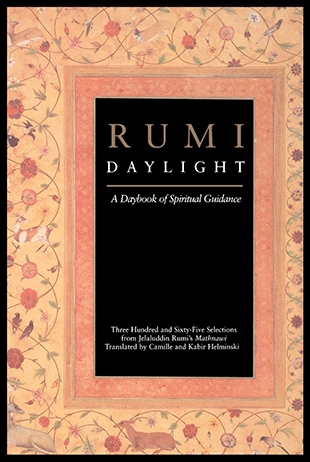"For more than ten years after meeting Shams, Mevlana had been spontaneously composing odes, or ghazals, and these had been collected in a large volume called the Divan-i Kabir. Meanwhile Mevlana had developed a deep spiritual friendship with Husameddin Chelebi. The two of them were wandering through the Meram vineyards outside of Konya one day when Husameddin described an idea he had to Mevlana: 'If you were to write a book like the Ilahiname of Sanai or the Mantik'ut-Tayr'i of Fariduddin Attar it would become the companion of many troubadours. They would fill their hearts from your work and compose music to accompany it.'
"Mevlana smiled and took from inside the folds of his turban a piece of paper on which were written the opening eighteen lines of his Mathnawi, beginning with:
Listen to the reed and the tale it tells,
how it sings of separation. . .
"Husameddin wept for joy and implored Mevlana to write volumes more. Mevlana replied, 'Chelebi, if you consent to write for me, I will recite.' And so it happened that Mevlana in his early fifties began the dictation of this monumental work. As Husameddin described the process: 'He never took a pen in his hand while composing the Mathnawi. Wherever he happened to be, whether in the school, at the Ilgin hot springs, in the Konya baths, or in the Meram vineyards, I would write down what he recited. Often I could barely keep up with his pace, sometimes, night and day for several days. At other times he would not compose for months, and once for two years there was nothing. At the completion of each book I would read it back to him, so that he could correct what had been written.'
"The Mathnawi can justifiably be considered the greatest spiritual masterpiece ever written by a human being. Its content includes the full spectrum of life on earth, every kind of human activity: religious, cultural, political, sexual, domestic; every kind of human character from the vulgar to the refined; as well as copious and specific details of the natural world, history and geography. It is also a book that presents the vertical dimension of life — from this mundane world of desire, work, and things, to the most sublime levels of metaphysics and cosmic awareness. It is its completeness that enchants us."
See our map for A Celebration of Rumi
